The difficulties of delivering healthcare in Scotland's far north
- Published
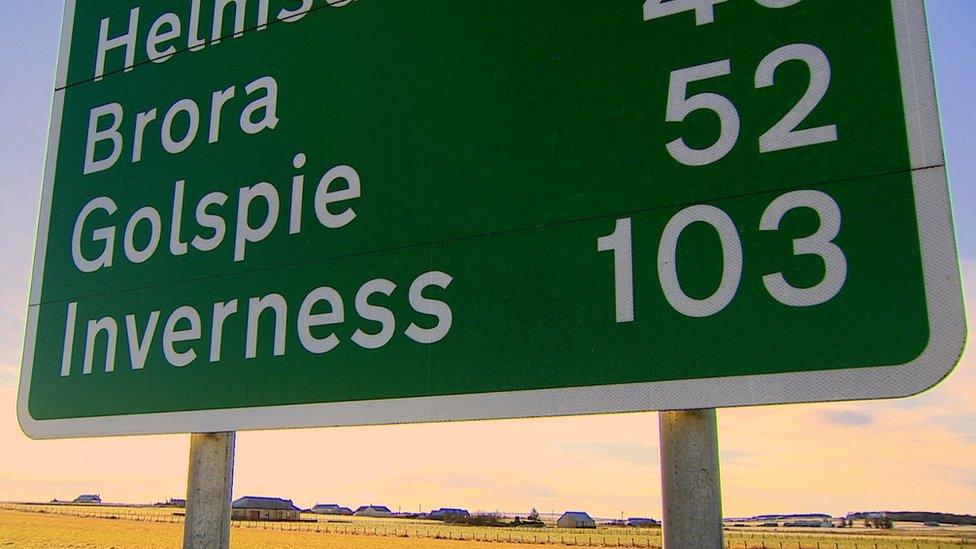
Plans to tackle staff shortages in key areas across the NHS in Scotland have been delayed again.
Health Secretary Jeane Freeman had said she would publish a full integrated workforce plan by the end of last year, but BBC Scotland understands there is not yet a date set for its publication.
There are well-documented problems in recruiting and retaining NHS staff but for rural and remote areas like Caithness it is especially tough.
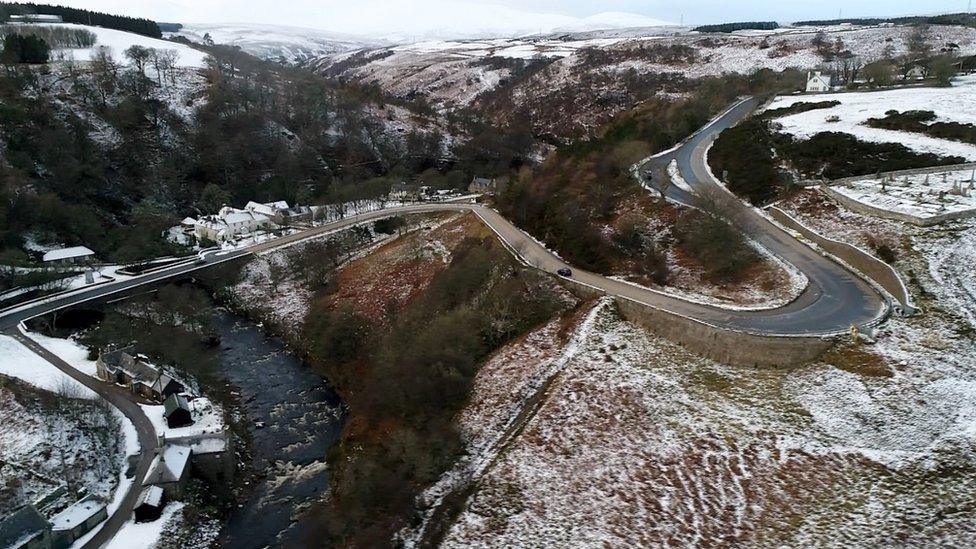
It takes about two-and-a-half hours to drive the 100 miles from Wick to Inverness
With a population of around 26,000 and covering 700 square miles, Caithness is one of the most hard to reach parts of mainland Scotland. The drive from Wick or Thurso to Inverness is more than 100 miles.
Four years ago, Caithness General Hospital in Wick was placed on enhanced monitoring because of a lack of senior staff.
In 2016, it was announced the maternity hospital would be downgraded to a midwife-led unit, meaning any complicated births would require a long, weary journey to Raigmore Hospital in Inverness, two-and-a-half hours away.
More recently there have been warnings about future GP numbers. There are only 12 full-time permanent GPs across the entire region.

The question is, what is being done about it?
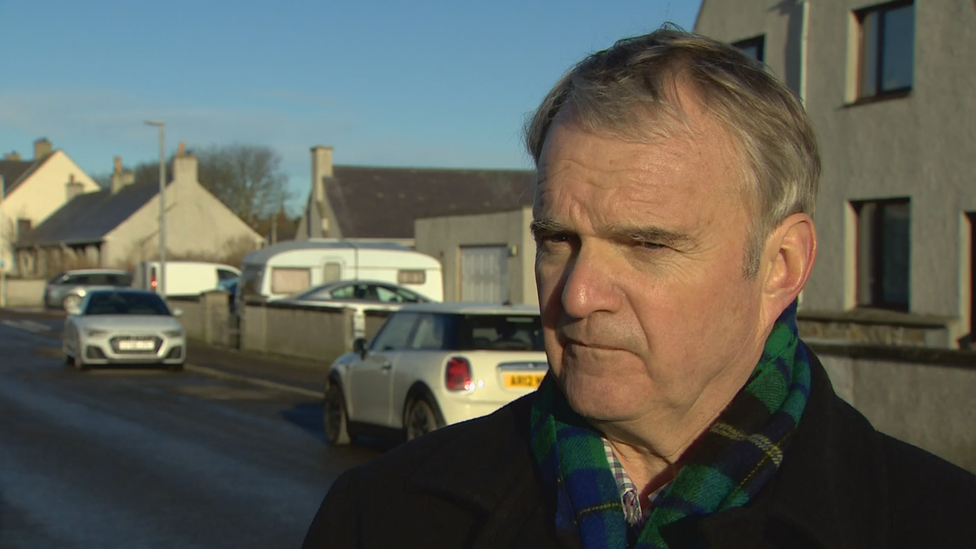
Ron Gunn says campaigners helped send a strong message to NHS Highland
Ron Gunn is a long time community activist and the current vice chair of CHAT, Caithness Health Action Team.
They made the health board sit up and take notice when they took to the streets to protest at what was happening.
Mr Gunn said his group were very concerned that a "bed review" in 2017 was going to lead to the closure of hospitals.
He arranged a day of action that saw about 1,000 people turn out in Thurso and a similar number in Wick.
"They sent a tremendously strong message to NHS Highland that they had basically enough," Mr Gunn said.
He said the NHS board said they were prepared to listen.
"They came up with the new options of the hubs at Wick and Thurso and the refurbishment of Caithness General Hospital."
That went to a three-month consultation and a 121-page report came back which NHS Highland has accepted.
"The health board have gone out of their way to listen to the people of Caithness," he said.

Rotating staff
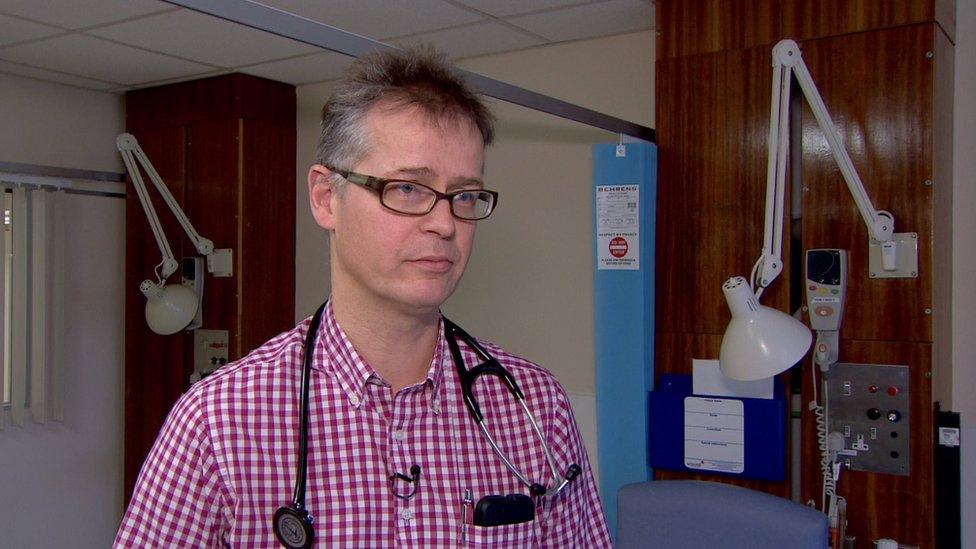
Dr Grant Franklin is part of a team of consultants who work at both Raigmore Hospital and Caithness General
NHS Highland says it is actively making efforts to plug the gaps as it puts in place sustainable solutions.
A tele-consultation service, "NHS Near Me" has been introduced to help cut down on long journeys for routine appointments.
It is also implementing changes so that consultants come to work at the hospital on a rotational basis.
Dr Grant Franklin is one of a team of consultants in acute medicine.
Based at Raigmore Hospital in Inverness, they each spend a quarter of their time in Wick.
"We realised there was a crisis of staffing here and so we volunteered to help, initially just on an ad hoc basis," said Mr Franklin.
"But this new model has meant we can actually employ more staff who are based in Raigmore, but who work here as well.
"And we hope it is a much more sustainable model than trying to attract people to only to work in Caithness."

The doctor who commutes nearly 700 miles
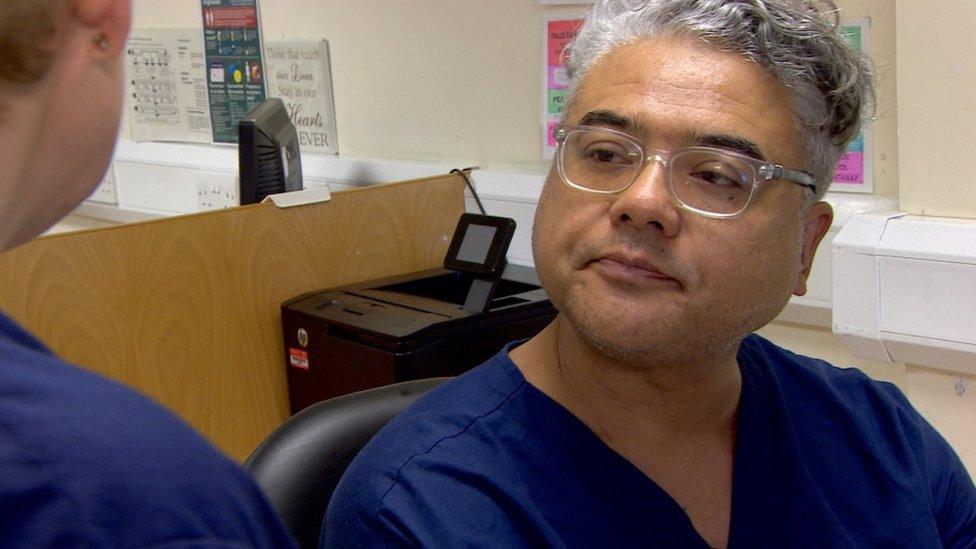
Dr Anton Van Wyk commutes from London to spend two weeks at a time working in Caithness
Dr Anton Van Wyk has an even longer journey.
He commutes from London to work for two weeks at a time at Caithness General Hospital and said he enjoys the challenges so much that he is considering moving here.
"Here we see everything. So everything that comes to the front door, we look after," he said.
"We have support from Raigmore or Aberdeen if they become too unwell to look after them here, as opposed to being shipped off to other places.
"In a big hospital I wouldn't see heart attacks, I wouldn't see strokes because they would go straight off to special units but here we can do it all in one place."
NHS Highland said it is early days but that there was already evidence that the new model of healthcare is working.
The board said the hospital's spending on temporary locum cover was going down, and they were now advertising for further permanent posts.
It acknowledged that more people than they would like still made the 100 mile journey to Inverness for routine appointments, but said it hoped that would also come down in time.

Baby on board
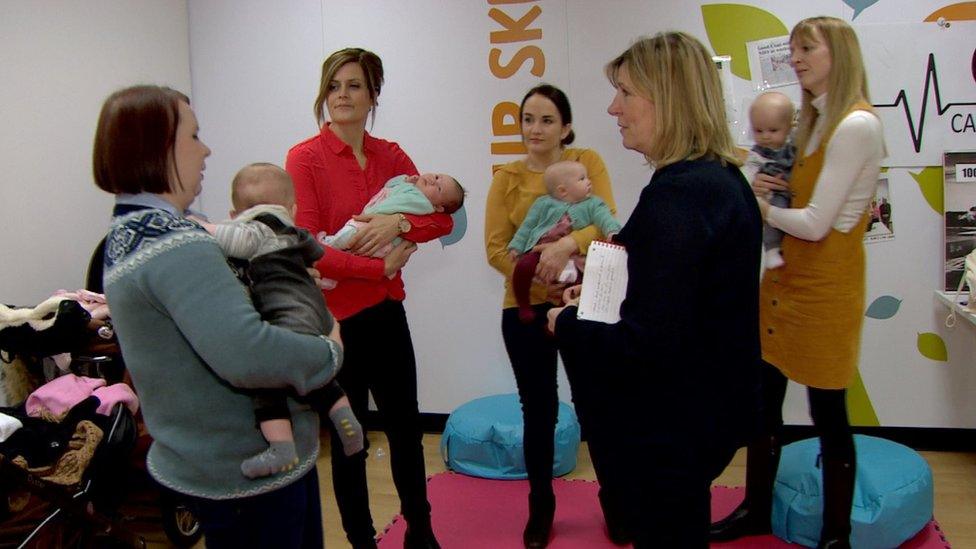
Mothers who had to travel to Inverness to give birth told the BBC they would like to see full maternity services reinstated in Wick
There are still some unaddressed issues. The maternity service in the far north remains a source of concern for those planning to have children.
Campaigners say that of 219 births last year, one was a home delivery, 18 at Caithness General and 199 local babies were born at Raigmore.
New mums meeting at a local group in Wick told BBC Scotland the journey to Raigmore to give birth was stressful, as was being so far away from their homes, and often other children.
One mother told how she had her first two children at Caithness General but had to go to Inverness for her third.
"The care at Caithness General is a lot more personal. The staff in Raigmore are so busy and so overwhelmed, there are so many births," she said.
"It was unfortunate for us that because we had two other kids at home, accommodation could not be provided for them.
"We had to pay for hotel accommodation for three nights. Otherwise that's a long time to be away from your other kids."
She added: "It is infuriating to see, they have got the facilities, they have got the midwives but they say they cannot justify taking staff up to Wick."
The health board says the current arrangements are safest for mothers and babies.

Keeping staff here
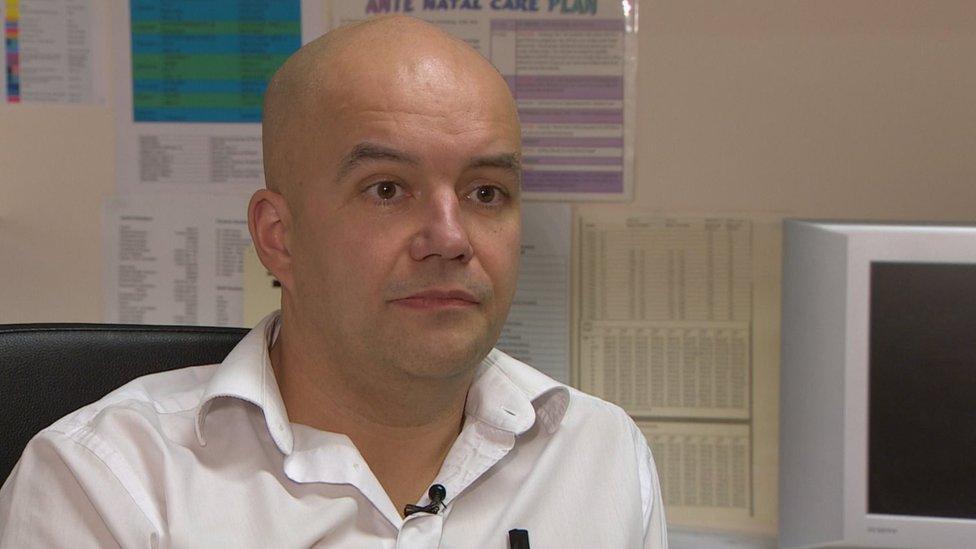
Dr Ewen Pearson is worried rural GPs are being penalised by the new GP contract
There is also a warning from some local GPs.
Dr Ewen Pearson came back to Wick to in 2004 to take over his father's practice.
He is worried rural GPs are being penalised by the new GP contract, and that short-term efforts to plug the gaps will make it even less likely they will attract permanent new recruits.
"I think there is an imbalance in the way that loyal staff who stay here and work very hard are treated compared to staff who come up as locums and spend a little bit of time here," he told the BBC.
"We really need to look after the staff who are already here very well, and make sure their terms and condition are at least as good as other staff who come maybe for a while but don't stay.
"If there are any young GPs out there thinking about whether they are going to work in Glasgow, where they get better terms and conditions, or work in the rural areas, well, they need to look at things like tax breaks and rural incentives not only for retention but also for recruitment.
"I'm one of the youngest GPs in the county and there are no trainees coming up behind me so you worry that in five or 10 years time the whole system will break down."

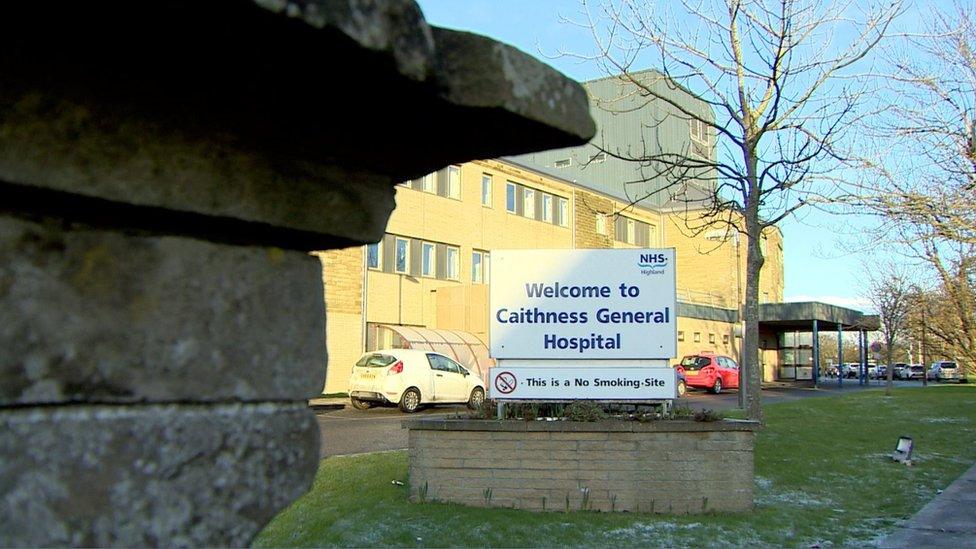
The Scottish government said it was developing a comprehensive plan to address recruitment and retention issues across Scotland
Training, relocation and incentives
NHS Highland said it was developing long term solutions to GP shortages. It said increases in nurses, physiotherapists and pharmacists with advanced skills were taking the pressure off GPs, and it was also recruiting two additional doctors.
The new chief executive of NHS Highland is only a week into the job. Iain Stewart's to-do list will be sizeable.
There is the ongoing independent inquiry into allegations of bullying, with an interim report expected later this month.
The board's financial director once again is warning of financial instability, with the cost of locum staff one of the significant factors.
And in a global medical marketplace, how can Mr Stewart make the Highlands a more desirable place to work and live?
The Scottish government says the NHS workforce is up 10%.
It says it is developing a comprehensive plan to address recruitment and retention issues across Scotland.
It says Brexit is compounding challenges but work is already under way.
A spokesman added: "This will include the steps we have taken to supporting recruitment and retention in remote and rural areas - such as introducing Scotland's first entry medicine programme (ScotGEM) last year; funding a GP Speciality Training (GPST) £20k bursary; and expanding the remote and rural incentive scheme and relocation funds."